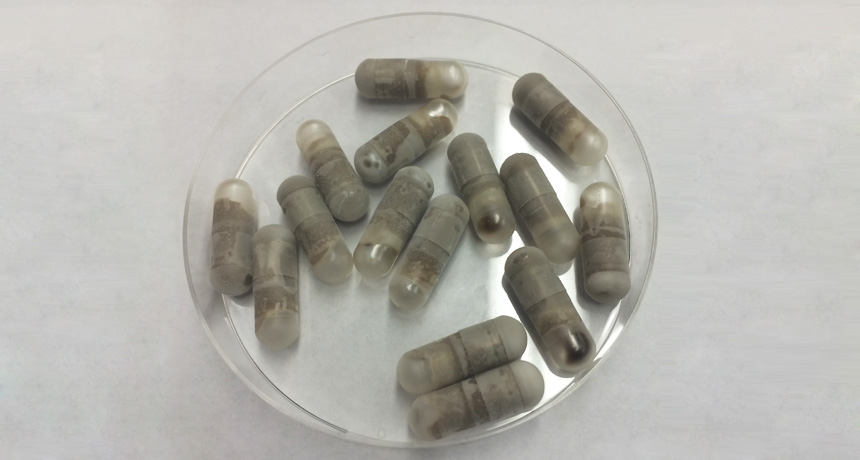Pills of frozen poop fight killer disease
Treatment gives patients the gut bacteria of healthy people

These capsules contain frozen feces from a healthy individual. When swallowed, the microbes in them may conquer the Clostridium difficile bacteria that can cause serious — even lethal — disease.
I. YOUNGSTER
By Janet Raloff
Icy nuggets of human feces, delivered in pill form, can treat a potentially killer intestinal disease, a new study finds.
When doctors mention transplants, they usually mean swapping in a healthy organ for one that had been sick or injured. The new tissue would come from a healthy donor. But sometimes healthy people contribute another type of donation: Poop.
The idea may sound gross, but fecal transplants are based on good science. Medical teams harvest gut microbes excreted in the feces of a healthy person. Those microbes are then used to build up colonies of health-promoting bacteria inside a patient infected with Clostridium difficile. These sickening bacteria — commonly called C. diff — can cause gut-wrenching pain and diarrhea. Each year, these infections also kill 14,000 people in the United States alone.
Fecal transplants began in animals more than a century ago, notes Lawrence Brandt. He’s a surgeon at the Albert Einstein College of Medicine in New York City. In those early cases, the procedure treated horses or other animals with severe diarrhea. Doctors made the first fecal transplant into a human in 1958, he says. Brandt has performed such implants since 1999. He described the value of the therapy for C. diff in an interview published in the March 2012 issue of Gastroenterology & Hepatology. (Gastroenterologists are doctors who treat diseases of the digestive tract.)
Such transplants have been very successful. They often quash a patient’s disease within a day or two. To date, hundreds of people have been treated. But getting healthy microbes for treatments has at times proven challenging.Doctors have used a range of techniques to transplant microbes into the gut of a sick patient. Some have inserted them up the rectum. Others have put them in pills that people swallowed. But live microbes can only live a short time outside the body. So treatments had to occur fewer than 6 hours after “donations” had been collected. And within that same short window, potential donors had to be screened. Doctors had to make sure the microbes being donated would not risk making an already sick person even sicker.
Ilan Youngster is a physician at Massachusetts General Hospital in Boston. For the new study, his team extracted healthy gut bacteria from donated stool. Then they froze the microbes into capsules. This greatly prolongs the “shelf life” of the microbes. The researchers gave the capsules to 20 people with C. diff infections. In 14 patients, the infections cleared up after taking a two-day regimen, or 30 capsules. Four more people improved after a second round of capsules. The overall success rate for the treatment was 90 percent, the researchers reported October 11 in the Journal of the American Medical Association.
“By using frozen samples, you can screen donors ahead of time and establish a ‘stool bank,’” says Younger, the study’s lead author. You might think of these banks as similar to a Red Cross’s blood bank. This Brown Cross, if you will, instead would bank fecal samples so that they would be “ready to use at a moment’s notice,” he told Science News.
Power Words
bacterium (plural bacteria) A single-celled organism. These dwell nearly everywhere on Earth, from the bottom of the sea to inside animals.
Clostridium difficile A bacterium that releases a toxin, which attacks the lining of the intestines. It can trigger colitis and severe diarrhea — conditions that can kill. In just the United States, C. difficile infections kill an estimated 14,000 people each year.
digestive tract The tissues and organs through which foods enter and move through the body. These organs include the esophagus, stomach, intestines, rectum and anus. Foods are digested — broken down — and absorbed along the way. Any materials not used will exit as wastes (feces and urine).
eradicated Eliminated; gotten rid of.
feces A body’s solid waste, made up of undigested food, bacteria and water. The feces of larger animals are sometimes also called dung.
gastroenterology This field of medicine focuses on studying the digestive tract and diseases that affect it.
gene (adj. genetic) A segment of DNA that codes, or holds instructions, for producing a protein. Offspring inherit genes from their parents. Genes influence how an organism looks and behaves.
germ Any one-celled microorganism, such as a bacterium, fungal species or virus particle. Some germs cause disease. Others can promote the health of higher-order organisms, including birds and mammals. The health effects of most germs, however, remain unknown.
gut Colloquial term for an organism’s stomach and/or intestines. It is where food is broken down and absorbed for use by the rest of the body.
infection A disease that can spread from one organism to another.
microbe Short for microorganism. A living thing that is too small to see with the unaided eye, including bacteria, some fungi and many other organisms such as amoebas. Most consist of a single cell.
organ (in biology) Various parts of an organism that perform one or more particular functions. For instance, an ovary makes eggs, the brain interprets nerve signals and a plant’s roots take in nutrients and moisture.
stool (in medicine) Another name for feces.
transplant (in medicine) The replacement of a tissue or an organ with that from another organism. It is also a term for the material that will be transplanted.







